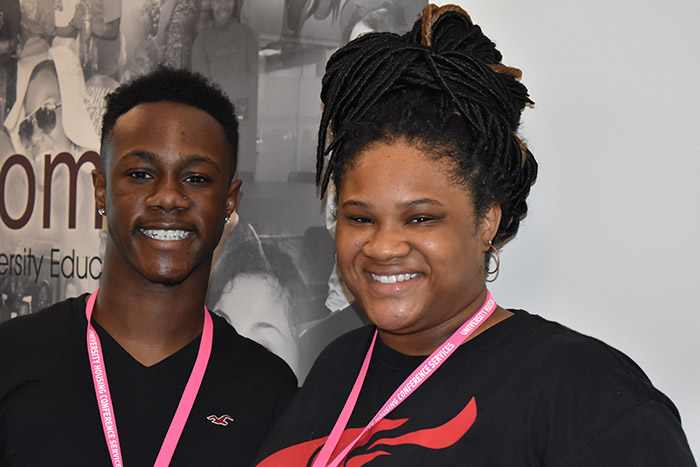Although her two older sisters had attended college, a big factor for Naudia Walton's success at the University of Arkansas was the Knowledge is Power Program (KIPP).
KIPP is a national network of college preparatory, tuition-free, public charter schools in 20 states. Founded in Houston, Texas, in 1994, the program has more than 88,000 students enrolled nationwide.
Walton, who is a college senior majoring in child development, said she was introduced to the KIPP Delta program when she was a fifth grader in Marianna, Arkansas.
"It taught you how the 'real world' was going to be and the life skills that you needed to succeed in it," Walton said.
This preparation for success in life as well as in college focuses on students in underserved communities.
For the past three years, the University of Arkansas has served as an official collegiate partner with KIPP, working with students in Helena, Blytheville and Forrest City. In June, middle school students from KIPP Forrest City visited the campus on a field trip to Northwest Arkansas. Fifty rising 9th and 10th grade students from KIPP Delta and KIPP Blytheville stayed on campus June 5-8, to explore various U of A programs and to attend Crystal Bridges Museum of American Art in Bentonville.
Kadarius Butler, a sophomore at the university, who is majoring in criminal justice and psychology, was a KIPP mentor this year.
"I had a strong connection with the kids because I really listened to them, and they appreciated that," he said. "They are smart kids that just need nurturing, and if they put their minds to it, they'll have bright futures."
While they were here on campus, the students participated in activities lead by campus professionals from different departments, not only to consider potential areas of study, but to reflect on their own experiences, identity, community, and how that plays a role in their high school career, and their college preparation and selection.
"By providing them an early exposure to the University of Arkansas, and developing relationships with individual students and cohorts of students as well as school staff, we're better equipped to meet the needs they may have as they apply to, select, and ultimately transition to college," said Sarah Draine, director of the College Access Initiative for the Center for Multicultural & Diversity Education.
Draine explained that the university provides specific access and support for KIPP alumni from not just KIPP Delta, Blytheville and Forrest City, but from any KIPP school around the country in order to increase college completion rates.
"We believe closer partnerships with higher education institutions are key opportunities for continued progress and learning," Draine said. "Our ultimate goal is to identify strategies that can be implemented by educational institutions to help close the achievement gap for all first-generation college goers and students of color."
In order to help prepare them for a more rigorous experience in higher education, KIPPsters, as they are often called, typically have extended school days and a longer academic year. This extra time allows the school to offer a strong academic program along with art, music and other extracurricular activities as part of the school day.
Staff, students and parents meet regularly to support the pupils' goals and accomplishments.
Walton says while the intensive structure took some getting used to, she came to realize how important it was as she continued her academic career.
"KIPP helped me to not only be adaptable, but to stay motivated," she said. "I think an excerpt from Robert Frost's poem, 'The Road Not Taken' best describes my KIPP experience," Walton said. " 'Two roads diverged in a wood, and I— / I took the one less traveled by, / And that has made all the difference.'"
Contacts
Scott Flanagin, executive director for communications
Student Affair Development & Communication
479-575-6785,
